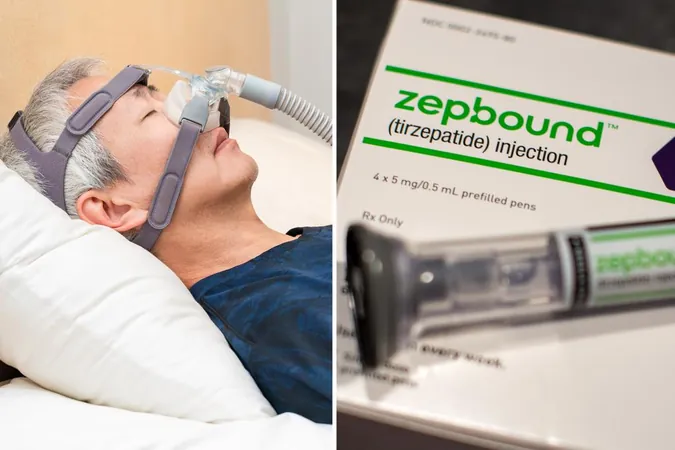
FDA Breaks New Ground: First Medication Approved for Obstructive Sleep Apnea That Also Aids in Weight Loss!
2024-12-25
Author: Kai
FDA Approves Zepbound for Obstructive Sleep Apnea
In a groundbreaking announcement, the US Food and Drug Administration (FDA) has approved the first-ever medication specifically designed to treat obstructive sleep apnea (OSA). The medication, Zepbound (tirzepatide), developed by Eli Lilly, is not only a game changer for those suffering from OSA but also offers weight loss benefits — a double win for patients.
On December 20, the FDA revealed that Zepbound is approved for adults with moderate to severe OSA who also struggle with obesity, making it a critical development for a growing demographic. The agency emphasizes that the medication should be used in conjunction with a reduced-calorie diet and increased physical activity for optimal results.
Dr. Sally Seymour, director of the Division of Pulmonology, Allergy and Critical Care at the FDA, hailed the approval as a significant leap forward. “Today’s approval marks the first drug treatment option for certain patients with obstructive sleep apnea,” she stated. The condition, which involves interruptions in breathing during sleep due to blockages in the upper airway, often affects individuals who are overweight or obese.
How Zepbound Works
Zepbound's mechanism is similar to well-known treatments like semaglutide (Ozempic and Wegovy), as it activates hormones in the intestine (GLP-1 and GIP) that reduce appetite and food intake. Studies indicate that while Zepbound helps patients shed unwanted pounds, it also significantly lessens the frequency of apnea events. In a year-long study, participants saw noteworthy improvements in their sleep apnea symptoms along with significant weight loss.
Potential Side Effects
However, like all medications, Zepbound comes with potential side effects. Common adverse reactions include nausea, diarrhea, vomiting, and gastrointestinal discomfort. Notably, while there are concerns about thyroid C-cell tumors observed in laboratory animals, the implications for human patients remain unclear. Consequently, the FDA warns that the drug should be avoided by individuals with a personal or familial history of certain thyroid conditions.
Expert Opinions
Experts in the field are optimistic about Zepbound's potential. Dr. Wendy Troxel, a senior behavioral specialist at the RAND Corporation, emphasized that this medication provides an important alternative for the millions facing the challenges of OSA. Approximately 30 million Americans suffer from this prevalent condition, and traditional treatments, such as positive airway pressure (PAP), may not be suitable for all. Up to 50% of patients find it difficult to adhere to these therapies, highlighting a pressing need for effective alternatives like Zepbound.
Dr. William Lu of Dreem Health in San Francisco points out the acute correlation between obesity and sleep apnea, stating, "For the patients who qualify and have no contraindications, tirzepatide has the opportunity to be a generational medication." He adds that while medication can play a vital role, lifestyle modifications remain essential for long-term success.
Conclusion and Future Outlook
As excitement builds around Zepbound, further guidance and consultation with healthcare providers are crucial to ensure safety and efficacy for those considering this new treatment. For many, particularly those whose bed partners bear the brunt of disrupted sleep, this medication could herald a new era of health, improved sleep quality, and weight management.
Whether you’re struggling with sleep apnea or trying to control your weight, Zepbound could be the breakthrough you've been waiting for! Don’t miss out on this revolutionary development that has the potential to change lives!


 Brasil (PT)
Brasil (PT)
 Canada (EN)
Canada (EN)
 Chile (ES)
Chile (ES)
 España (ES)
España (ES)
 France (FR)
France (FR)
 Hong Kong (EN)
Hong Kong (EN)
 Italia (IT)
Italia (IT)
 日本 (JA)
日本 (JA)
 Magyarország (HU)
Magyarország (HU)
 Norge (NO)
Norge (NO)
 Polska (PL)
Polska (PL)
 Schweiz (DE)
Schweiz (DE)
 Singapore (EN)
Singapore (EN)
 Sverige (SV)
Sverige (SV)
 Suomi (FI)
Suomi (FI)
 Türkiye (TR)
Türkiye (TR)